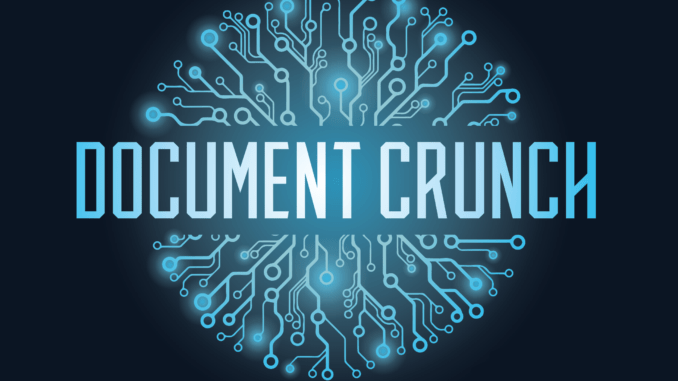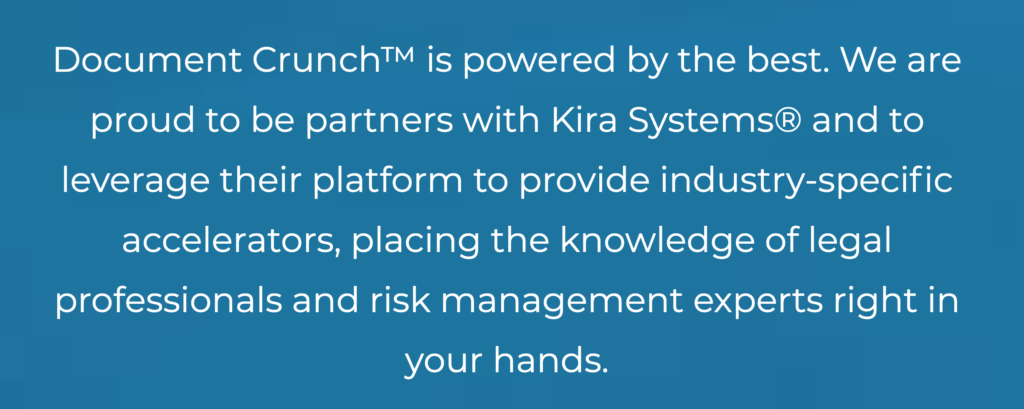
Remember the marketing slogan for computer chips, ‘Intel Inside‘? US-based Document Crunch is an AI doc review startup focused on the construction sector, but built upon Kira Systems’ core technology, i.e. ‘With Kira Inside‘.
As explored below, this approach of one company taking another’s machine learning and NLP system, and then building out its own tailored pre-set review capability for a certain market on top of this, opens up a huge swathe of potential territory similar to a franchise opportunity.
More on the franchise idea in a moment, but first, Document Crunch.
Joshua Levy, senior inhouse counsel at JE Dunn Construction, told this site that the Florida-headquartered company was the idea of himself and Adam Handfinger, a senior lawyer at niche construction law firm, Peckar & Abramson. Although he stressed that Document Crunch is entirely independent of those two businesses.
The company soft launched at the end of last year and is steadily gaining traction in the US. It’s aimed, at least initially, at small to medium size construction companies – most of which don’t have inhouse lawyers – but who have to review very long and complex contracts related to their projects and insurance-related issues.
Levy noted that these documents can range from 30 to 200 pages or more, and one can imagine few people not trained in the law would want to pick through them, trying to find out what was most important to a specific construction project.
So, they’ve taken Kira’s core technology via a partnership, trained it up for the very particular language and clause types found in the construction industry, then built out their own interface, and now have gone to market with a pre-set AI review tool fitted out specifically for their industry.

Document Crunch could potentially be used for larger review tasks, but what it’s really there for is handling large, but single documents, in order to highlight what is there and what may be missing that could impact a construction company. Often this is around the negotiation stage of a contract.
The core idea Levy explained, is that they ‘want to make AI available to the population, not just for Big Law and big business‘.
I.e. it doesn’t have to be used by a General Counsel at some massive developer, (though that is indeed possible and they would benefit from the system). It could also be used by a medium-size company putting up apartments, for example, that has no lawyer on staff and may want to review a document, and then decide if they need to bring in a lawyer or not. In many cases the review will suffice. Although, Levy is also keen to stress the startup is not providing legal advice.
But why do this? As Levy said to Artificial Lawyer: ‘Construction is one of the last industries that has not benefited from technology [of this type]. Most documents are still held in boxes.’
Levy added that they’ve also created a tool for insurance documents related to construction projects and are now looking at other areas, including real estate, corporate governance, and for the high tech sector – such as end user license agreements.
Of course, the unique selling point for Document Crunch is that it’s designed for the construction sector by people who really know that industry and the terms and issues involved in its often complex documentation. They also have a team of other subject matter advisers to add their insights.
And this brings us to the wider point, AI franchises
AI Franchises
The central challenge with machine learning, NLP tech is that – by its very nature – it needs to be trained. Vanilla software needs to be tailored to the very specific language types found in certain types of documents. That needs subject matter experts.
In the above case they saw a gap in the market. Most legal AI review/analysis companies have focused on mainstream corporate documents – often around event-driven matters such as M&A due diligence. Then some branched out into real estate documents, as well as complex financial contracts.
But….this still leaves many sectors of the economy without an easy to use pre-set review tool, but which from the fashion industry to the media world, all also have similar needs.
This is especially the case where the sector has a lot of small to medium size businesses that don’t have their own teams of inhouse lawyers, but want to quickly understand what is in a contract, what matters, and what may be missing.
In short, you could see a sort of franchise model taking shape, where subject matter experts all over the world created their own small AI companies to help their particular sector – but – and this is the key point – based on the tech of a well-known and trusted company, such as Kira or other market leader, for example.
Company A, which is the core provider of the tech, keeps working on the areas it’s best at, for example large scale M&A due diligence, but ‘franchise’ companies B, C, D and E, are all beavering away at a range of niche subject areas – but where there may be demand from a good volume of potential clients that don’t have their own legal teams. And these franchises are all using company A’s tech.
Let’s see if the idea catches on.